Paheli set up an experiment using liquid A in the beaker as shown in Fig. 14.4. She observed that the bulb glows. Then she replaced the liquid A by another liquid B. This time the bulb did not glow. Boojho suggested replacing the bulb by an LED. They observed that the LED glows. Explain.
The current through liquid B could be weak and therefore unable to make the bulb glow. However it was strong enough for the LED to glow.
Related Solutions
Paheli set up an experiment using liquid A in the beaker as shown in Fig. 14.4. She observed that the bulb glows. Then she replaced the liquid A by another liquid B. This time the bulb did not glow. Boojho suggested replacing the bulb by an LED. They observed that the LED glows. Explain.
View SolutionBoojho made the circuit given in Fig. 14.3 and observed that the bulb did not glow. On Paheli’s suggestion he added one more cell in the circuit. The bulb now glows. Explain.
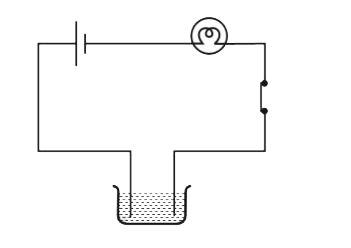 View Solution
View SolutionPaheli connected two bulbs to a cell as shown in Fig. 12.8. She found that filament of bulb B is broken. Will the bulb A glow in this circuit? Give reason.
View SolutionWill the bulb glow in the circuit shown in Fig. 12.6? Explain.
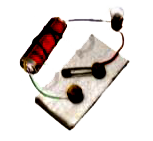 View Solution
View SolutionAn appratus was set up as shown in the figure. It was observed that when an aqueous solution of HCl was taken in the beaker and the circit was closed, the bulb in the circuit began to glow, but it did not glow when the experiment was repeated with glucose solution. what could be the reason?
Would the bulb glow if the same experiment is repeated with an aqueous solution of
NaOH? why?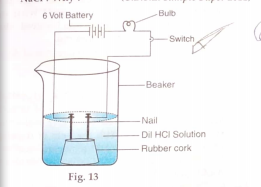 View Solution
View SolutionAn appratus was set up as shown in the figure. It was observed that when an aqueous solution of HCl was taken in the beaker and the circit was closed, the bulb in the circuit began to glow, but it did not glow when the experiment was repeated with glucose solution. what could be the reason?
Would the bulb glow if the same experiment is repeated with an aqueous solution of
NaCl? why?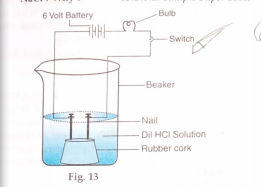 View Solution
View Solutionचित्र में सुरक्षा पिन की जगह यदि रबड़ लगा दें तो क्या बल्ब दीप्तिमान होगा?
View Solutionसुरक्षा पिन की जगह यदि रबड़ लगा दें तो क्या बल्ब दीप्तिमान होगा?
View SolutionZubeda made n electric circuit using a cell holder shown in fig.14.4, a switch and a bulb. When she put the switch in the 'ON' position, the bulb did not glow. Help zubeda in identifying the possible defects in the circuit.
View SolutionBoojho and Paheli performed experiments taking similar bulbs and cells but two different solutions A and B as shown in Fig.14.1. They found that the bulb in the setup A glows more brightly as compared to that of the setup B. You would conclude that.
View SolutionWould the bulb glow in the circuit shown in Fig. 12.15?
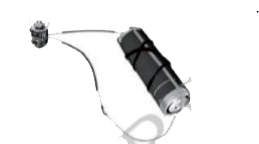 View Solution
View SolutionObserve the following set up :
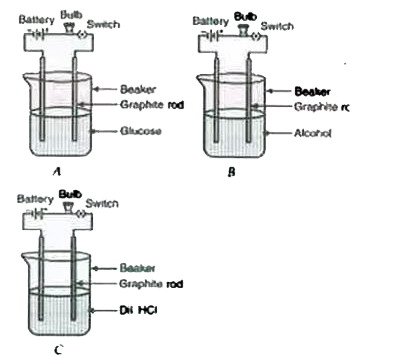
(a) Which of the bulb glows ?
(b) Give reason for each of the case.
(c ) What would be the change observed if the content of the beaker B is replaced by NaOH solution ?View SolutionIn the circuit in Fig. 7.27 , bulb B does not glow although ammeter A indicates that the current is flowing . Why does the bulb not glow?
View SolutionIn the circuit in Fig. , bulb does not glow although ammeter indicates that the current is flowing . Why does the bulb not glow?
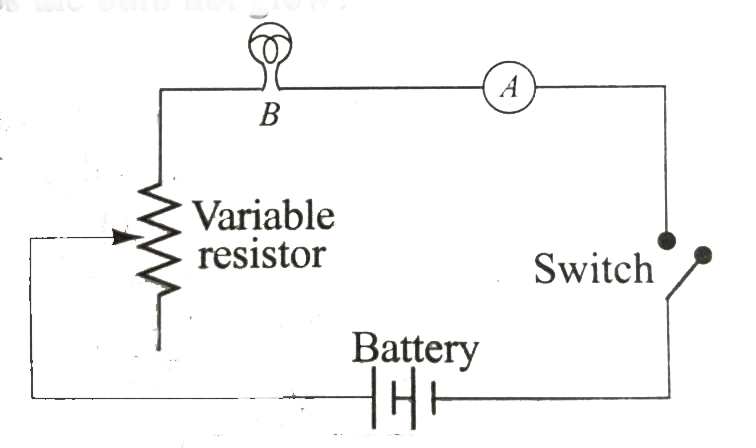 View Solution
View SolutionA tester is used to check the conduction of electricity through two liquids, labelled A and B. It is found that the bulb of the tester glows brightly for liquid A whiIe it glows very dimly for liquid B.
You would conclude thatView SolutionA tester is used to check the conduction of electricity through two liquids, labelled A and B. It is found that the bulb of the tester glows brightly for liquid A while it glows very dimly for liquid B. You would conclude that :
View SolutionA tester is used to check conduction of electricity through two liquids labelled A and B: It is found that the bulb of the tester glows brightly for liquid A while it glows very dimly for liquid B. What is your conclusion ?
View SolutionA tester is used to check the conduction of electricity through two liquids labelled A and B. It is found that the bulb of the tester glows very brightly for liquid A while it glows dimily for liquid B. You would conclude that.
View SolutionExplain why the bulb would not glow in the arrangement shown in Fig. 12.13.
View SolutionArjun creates a tester circuit with an LED and dips its free ends into the beakers of different liquids.In which of these liquids will the LED glow?
View Solution
